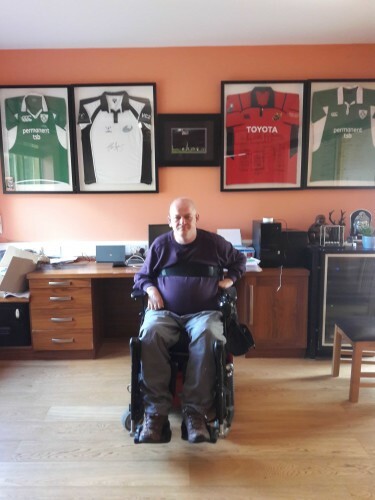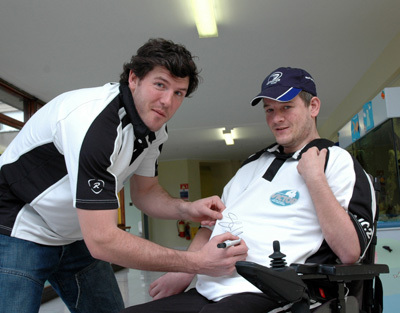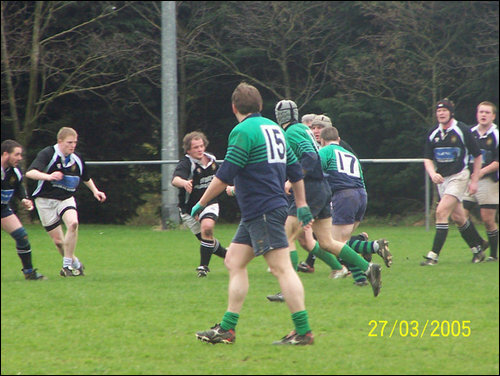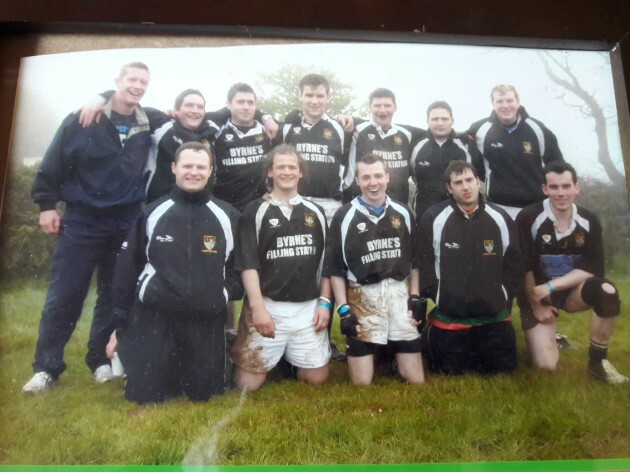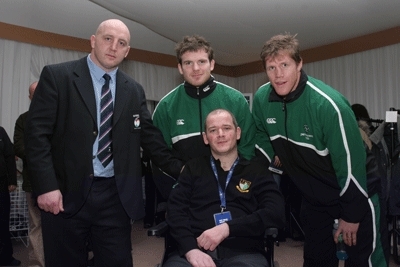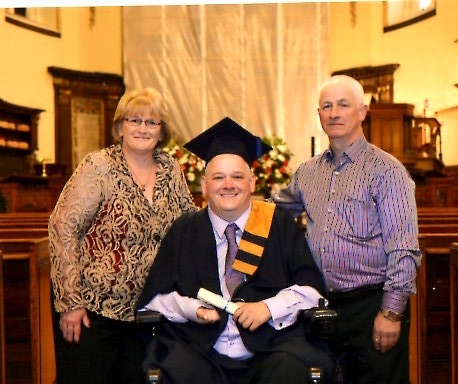The Unknown
A RUGBY PLAYER is lying facing down in the grass after hearing a pop in his neck during a scrum, when he turns to his team captain looking for a cigarette.
‘I may as well have a fag while we’re waiting for the ambulance,’ he thinks to himself.
A casual half-time smoke on the sideline is a regular sight for players in the Longford Rugby club in 2005. They would often carry cigarettes in the pockets of their shorts while one player would be delegated with the task of bringing a lighter for everyone to share.
Panic descends on those looking on at the scene. A doctor is on the other end of a phone line, giving instructions to stick a pen in the foot of the player lying motionless on the ground.
But the 25-year-old hooker isn’t feeling the distress. He’s not thinking about the consequences of his head colliding with the shoulder of his opponent from the Roscrea team. Or the fact that he can feel all the energy draining from his body.
He just wants a cigarette.
Almost 14 years on from the accident, Victor Connell still can’t explain why he was so calm in that moment. And it will be some time before he can come back to the Longford Rugby club on his own to get some form of closure on a chapter that changed his life forever.
But for now, he’s on his way to Mullingar Hospital and will later be transferred to the Mater Hospital and the National Rehabilitation Centre in Dún Laoghaire before he can return home to pick up his life again in Killoe in north Longford.
As he’s carried into the back of an ambulance, Connell turns to one of his friends before beginning the journey into the unknown.
“Jesus, what am I after getting us into now?”
The Transformer
A van pulls up at a bungalow facing the local GAA pitch in Killoe. There’s some whirring noises before a motorised wheelchair carrying the driver appears, and reverses out through the back of the vehicle.
It’s quite the entrance.
“The children in my mother’s creche call me a transformer,” Connell tells The42 as his dog Tyler — a beautiful cross between a corgi and a Jack Russell — arrives to welcome him home.
Connell designed this house in his head during a second stint at the Rehabilitation Centre in Dún Laoghaire, and his imagination has produced a lovely place to call home. It was one of the things he wanted to achieve as part of a 10-year plan and the local community rallied around him to get the job done.
There’s plenty of space for him to move about freely in his chair and various devices that make independent living possible for him.
The voice of his Alexa technology greets us when we enter the kitchen and a panel of buttons on the wall allow Connell to control different functions in the house.
A telescope sits in front of a window in the conservatory which he might look into making more use of in the future, and there’s a barbecue outside in the garden for entertaining.
There’s also a Fianna Fáil map on the kitchen table which contains the Granard electoral area that Connell is hoping to represent as a Longford councillor.
As the owner of a counselling business in Longford, issues relating to mental health will be one of his main areas of focus if he gets elected. Improving accessibility for disabled people in the midlands county is a huge priority for him too.
The votes have been cast and he’ll discover his fate this weekend when the results of the local election are revealed.
“If people looked at me, they’d think ‘well what can you do?’
I’m sort of trying to prove them wrong and show them what I can do by driving and building a house, going back to college and setting up my own business and becoming a county councillor.”
A Good Sport
Rugby hats and scarves are placed throughout the house too. In his office, four rugby jerseys are suspended in glass frames above the computer, peppered with signatures from famous players.
He’s still very passionate about the sport that he discovered as a secondary school student in St Mel’s College in Longford.
“Two of my uncles and a first-cousin died when I was 15 in a car crash,” Connell begins when explaining the background of his interest in rugby.
I had anger issues over that. I was very close to one of the uncles so I didn’t really know where to put my anger.
“I realised that rugby was great for getting the anger out so I used it as sort of my release. Any sort of anxiety or tension that I’d built up during the week, I’d take it out at training over the weekend. And then the anger disappeared and I enjoyed the comradeship with the lads down there.”
Connell always played on the front line of the scrum. He played the tighthead and loosehead prop roles from time to time, but hooker was always his preferred position.
Keith Wood and All Blacks legend Sean Fitzpatrick were the masters of the trade that he looked up to.
He was shaping up to be a fine player in his teens and received call-ups to the Midlands rugby team at U16 and U18. He went for Leinster trials at U18 level as well, but he never really envisaged his career going down the professional route.
Rugby was simply a sport that was good for him.
“I wasn’t a great rugby player but I wasn’t bad,” he says. “I put my head where a lot of other people wouldn’t.
“It was like turning a switch when I went out onto a rugby pitch. The calm Victor stayed in the dressing room and the bit of a lunatic went out,” he laughs.
Inside The Scrum
All sorts of dark arts could be performed in the scrum, and Connell certainly didn’t shy away from the nasty strokes.
There was a lot of biting and pulling, biting ears and biting a lad’s beard and giving it a good pull. The tricks of the trade. No-one can see what you’re doing.”
Injuries were impossible to avoid, of course. Groin strains, bruising and soreness were all normal unpleasant feelings that he carried home from a game. He even picked up a few bangs on the coccyx from scrums and rucks where “some lad would give you a knee up the backside.”
All standard injuries. Nothing that would keep him sidelined for longer than a few weeks.
Dark Humour
“I never broke anything…. apart from me neck,” he smiles, always treating his injury with some humour.
Connell always endeavors to do things this way to make people feel at ease in his company. Whenever he meets the referee who took charge of that game, he playfully brings up the scrum that changed the direction of his life.
“I just laugh and say, ‘I told you to blow up that game early.’
He hasn’t had an opportunity yet to meet up with the Roscrea players who were in the front row opposite him, but he’s confident that will happen in time.
‘I’m hurt, I’m hurt’
Sunday, 2 October was a wet day. Connell had been at the Longford Rugby Club the night before following the anniversary mass of one of his friends, and after some sandwiches and a few drinks, he retired to bed at around half 12.
The match against Roscrea the following afternoon was a scrappy battle. It was saturated with scrums. At least 20 by Connell’s count.
With about five minutes to go, another scrum was called. Liverpool were playing Chelsea that day and Connell, who wanted to watch the game, jokingly asked the referee to forget about the scrum and finish the match early.
But they all hunkered down and got back to work. The ref wasn’t happy with the first scrum and called for a reset.
“Back then there was no crouch, touch, pause, engage,” Connell explains. “It was just down and in. It was the old style and hell for leather. You had to line yourself up to get between the hooker and the prop.
“I think me and one of my props weren’t fully straight. I can’t rightly remember but one or two of the lads that were playing said we were skew-ways. When I went in, I hit the other hooker’s shoulder head on.”
Connell instantly knew he was in trouble.
“I just let out a roar, ‘I’m hurt, I’m hurt.’ And everybody just pulled apart and I was just on the ground.
“The manager and physio came over and I said, ‘don’t move me. My neck is broken.’
“It popped one of the vertebrae out of my spine. I didn’t actually sever my spine so it would be what you call an incomplete injury. So that was it. I felt the pop.
It was a strange feeling, the energy just leaves your body from that point. It just goes out your feet and that’s that. I knew straight away that it was serious. I knew from the way the power had left my body that I was paralysed. I was looking down and knew I couldn’t move my legs.”
C4-C5… an incomplete injury
On the night of the accident, Connell was in the Mater Hospital where weights were placed on his head in an attempt to push the vertebrae back into place. That procedure was unsuccessful and surgery followed.
A doctor arrived at Connell’s bed the following morning with a prognosis that would shake Connell’s world and change his life forever.
He didn’t go for sensitivities when he was delivering the news. It was C4-C5, an incomplete injury. Connell was now a quadriplegic.
“He says, ‘you’ll never walk again, you’ll never use your arms and you’ll probably be on a ventilator for the rest of your life.’ So that was great news to hear.
He was that clinical and I couldn’t believe it. Even thinking back on it to this day, I’d love to meet him again just to…. Like in one way, it was good because there was no bullshit. But in another way it was a huge shock to the system.”
Connell was certainly at a low point but things were about to deteriorate further. As a high-dependency patient, he was breathing through a mask which he didn’t like and within a few hours, he had developed pneumonia. He needed a tracheotomy which took away his power of speech.
Recovery would begin shortly after for Connell, but he first had to confront the understandable feelings of despair circling in his head. Suicidal thoughts crossed his mind. He’s not a religious man but he prayed while he was in hospital, sometimes just for the simple mercy of being able to sleep.
A nurse who was working on night duty played a huge role in helping him overcome his grief and reach the stage of acceptance.
I had one or two bad, bad nights where I had no control over any bodily functions. I was puking and everything. I think I had a good cry for myself and one of the nurses that was there just came over and we had a chat for about an hour.
“I was probably getting used to the medication as well, and getting used to people turning you over and turning you back.
“It was just a case of ‘oh God, is this going to be it for the rest of my life? If it is, Jesus what am I going to do? Who’s going to look after me?’ All these things were spinning round in my head. It was all negative, negative, negative.
“Family life was over. I’ll never have a girlfriend, I’ll never have kids. I’ll never have this, never have that.
She said, ‘things are bad now but they will improve. You’re just getting used to this. Your body might be gone but your mind is there. You haven’t got a brain injury.’ And that really hit home.”
Building A New Life
Connell had other reasons to feel fortunate about his situation. Within a few hours of that conversation with the nurse, the patient in the bed beside him died. Another patient passed away the following day. He had lost friends and relations to death too over the years, and the combined impact of all this tragedy gave him some much-needed clarity.
When he was later transferred to the Rehabilitation Centre in Dún Laoghaire, Connell met patients who were suffering more than him, including those with brain injuries.
It wasn’t as though the difficult thoughts left his mind entirely. There were still dark days to face, but the focus to recover as much as he could was always at the forefront of his mind.
His arms, neck and back muscles were some of the few things that fate left behind after the accident for Connell to thread his new life together with. He had the tools and now he had to go to work.
“Life had possibility and it wasn’t over,” says a resilient Connell.
“I’m not inhuman. Of course I thought about suicide. But when I was in the depths, I was lucky I was in a safe place in intensive care. Even though the thoughts were there I didn’t have the opportunity to do it.
You’re not a prisoner in your own body if you have your mind. If I have my mind, I can still do things.
“Life can improve for me but for someone with a brain injury it’s so much harder. I suppose that’s what brought me down to earth and that’s what the nurse was trying to say to me in the intensive care unit.”
Connell was discharged from Dún Laoghaire the following summer and enjoyed those few months of freedom with his friends, going to the pub and heading off to matches.
He would have to be admitted again to hospital for another five months after failing to take better care of a pressure sore, but while that second stay in Dún Laoghaire was more difficult for him, that was the time when Connell really began to take control of his new life.
He drafted up his 10-year plan and the five goals he wanted to box off in that time. In addition to getting his house built, the other tasks were to get healthy, get driving, go back to college, and start earning money.
It took him just eight years to complete it all.
The ‘transformer’ van is testament to his successful attempt at getting a driving licence. And his work as a psychotherapist and counsellor is the outcome of his studies in Athlone IT.
Becoming a county councillor is one of the new goals he has set for himself, while he also wants to do a sky dive later this year as part of a fundraiser. Using a special exercise bike and some free weights, he also works out too.
He was the fittest he ever was at the time of the accident, having shed two-and-a-half stone while on a diet.
In his former life, Connell was right-handed. But it was two years before power was restored in that arm, meaning he was forced write with his left hand using an adapted pen. It ended up being a blessing in disguise.
“I can actually write better with my left hand than I ever could with my right hand. The teacher always said I was like a spider after crawling out of the ink and crawling across the page.
“The funny thing is when I started writing with my left, I started joint writing automatically. I didn’t even have to teach myself, it just happened.”
A Better Life
After getting his driving licence, there was one place that Connell wanted to go. He had been back to the Longford Rugby club a few times at night, usually for a function. And he was there when his team-mates secured promotion, a day of celebration that was tinged with sadness as he looked on at the team he was once part of.
But it was the day he took himself back to the rugby club on his own that stands out as a milestone moment for Connell.
“I went out to the pitch and sort of [thought] ‘that was where it happened.’ I sort of replayed it in my head and reminisced a little bit. I sort of said, ‘it all changed here’ and that was it. I got in the car and came home again.
It was one of those things that I wanted to do, to be on my own in that area and have my own headspace. And maybe even put a close to it. That independence was the final step.”
The reality of being in a wheelchair is never far from Connell’s thoughts. He rarely thinks about the accident but when he does take time to reflect, the memories pose a few questions.
Would he have survived the pneumonia had he not been in peak physical condition? Would he have been stronger in the scrum had he not lost the weight?
“These are things that go through your head,” he surmises.
Breaking his neck was a life-altering chapter in Connell’s life, but as he discovered, it wasn’t the end. He picked up the tools and constructed a new life for himself.
It’s coming to the end of our conversation and Tyler is back in the room, looking for his owner. Connell picked him up from the pound and would surely have been euthanised had he not been re-homed.
In many ways, Victor Connell 2.0 is a better version of his former self. As long as his mind is alive, he’ll never be a prisoner in his own skin.
“I often think life is better in some ways. It gave me a whole new outlook whereas maybe I was a bit selfish before. It’s given me a freedom in a certain sort of way. It’s hard to describe.
Breaking my neck was maybe one of the better things that happened to me. I think it’s just a natural thing for me to think about it positively. 60 or 70% of the good things in my life have happened since that.
“I won Longford Person of the Year, that wouldn’t have happened if I wasn’t in a wheelchair. I hate the word inspire and I don’t set out to inspire anybody. I just get on with life.”
If you need to talk, you can contact Pieta House here.
Subscribe to our new podcast, The42 Rugby Weekly, here:
